Getting a new curl or body wave is a fun way of giving yourself a new look.
Of course the downside to perming your hair, especially if you do it too often, is over-processed hair. This can cause damage to the cuticle and even breakage.
All the chemicals involved in changing the texture of your hair is quite corrosive to the hair strand, so how do you remedy it without paying an arm and a leg?
Let’s take a look at some home remedies you can do yourself to help repair your hair.
Recognizing Over-Processed Hair
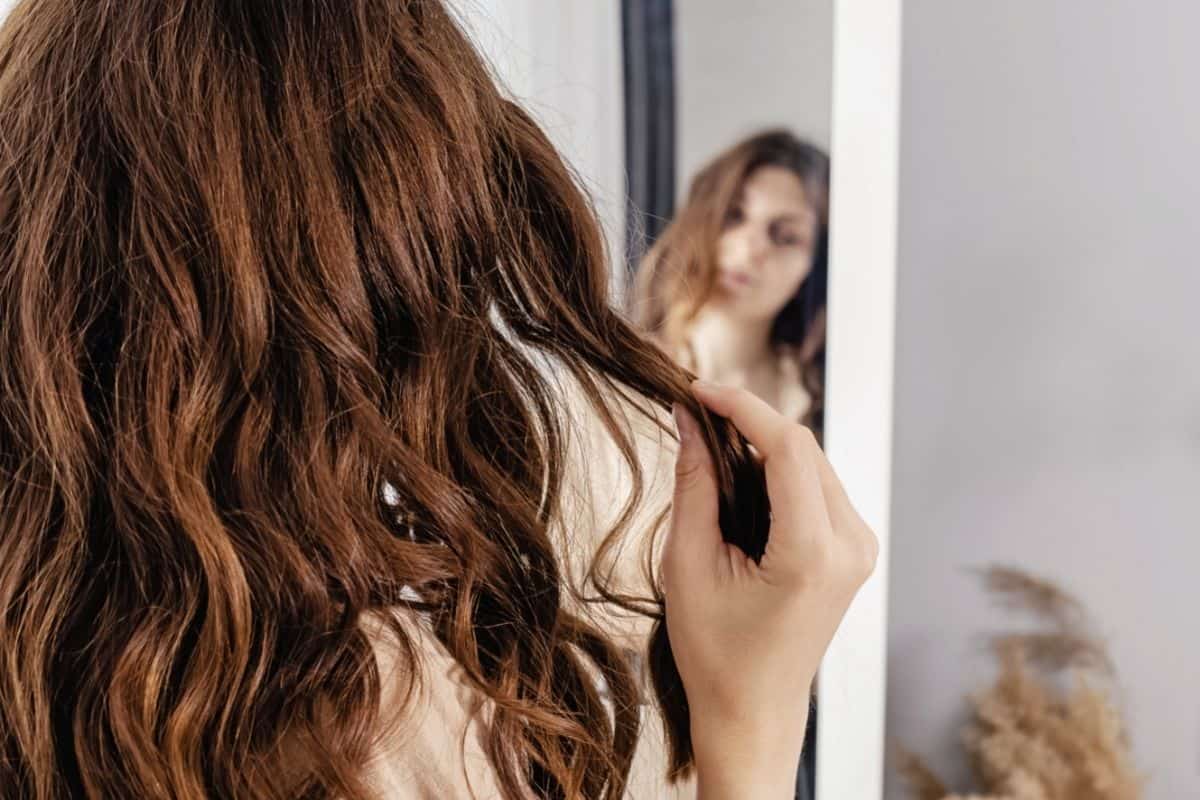
If you’ve noticed that your hair is damaged, there are a few ways you can tell if it’s worth spending money on getting it fixed.
The first thing to look out for is split ends.
You should see these at the end of each strand of hair. They’re usually fairly obvious, but they can sometimes be hard to spot.
If you find them, then you know that your hair needs help.
The next thing to check is how smooth your hair feels when you run your fingers through it.
Smooth, supple hair indicates healthy hair, while roughness and brittleness means that your hair is damaged.
Rough hair will feel like straw, which isn’t good news.
The third thing to look out for is flakes. These are little bits of dry skin that fall off your scalp.
Flakes indicate that your hair is shedding, which is another sign that it’s not looking its best.
The Risks Of Over-Processing Hair With Perms
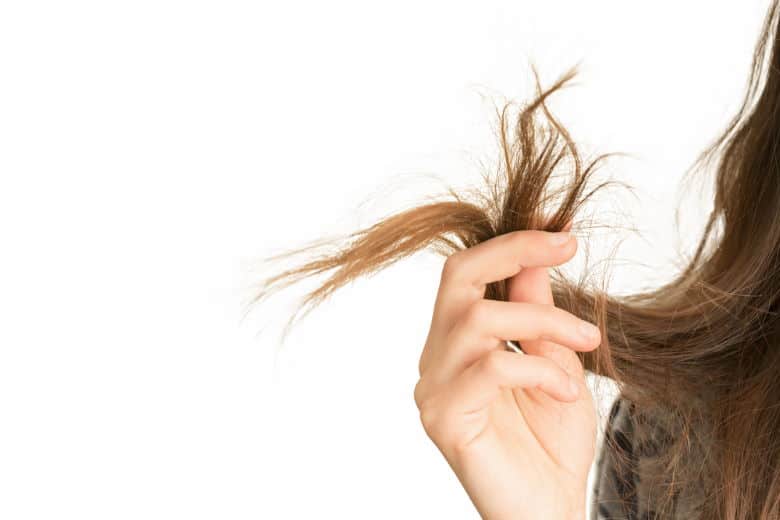
Perming your hair too often can lead to all sorts of problems. Some of these include:
Dryness
An over-processed perm can leave your hair feeling very dry, especially if you don’t condition your hair afterwards.
Damage
All the chemicals involved in perming lotion – mainly ammonium thioglycolate – strip away the natural oils in your hair.
What the lotion does is break down the natural protein bonds that make up your strands in order to curl or straighten them, depending on the type of perm you’re getting.
You’ll often find your hair feeling brittle and flaky, indicating that your hair health has been compromised.
Breakage
Perms can cause your hair to lose its elasticity, making it more likely to snap and break off.
Smell
Over-processed hair can cause your hair to smell bad – both because of the chemicals used and because of the heat applied.
Frizz
Over-processed hair often becomes a frizz fest due to lack of moisture and a raised cuticle (or outermost) layer.
Knots
Knots can form in permed hair, especially if you’re going from straight to curly.
Split ends
As mentioned earlier, split ends are a sure sign of damage. It might not just be from chemical treatments though – environmental as well as heat styling are also culprits.
Scalp Irritation and Redness
Lastly, getting a perm can cause significant scalp irritation and redness.
Many people experience skin irritation not only on their scalp, but on their neck and even shoulders – anywhere perming lotion might have landed.
If you have sensitive skin, you’ll likely experience some sort of skin reaction to the chemical treatment involved in perming your hair.
What To Do About Over-Processed Hair
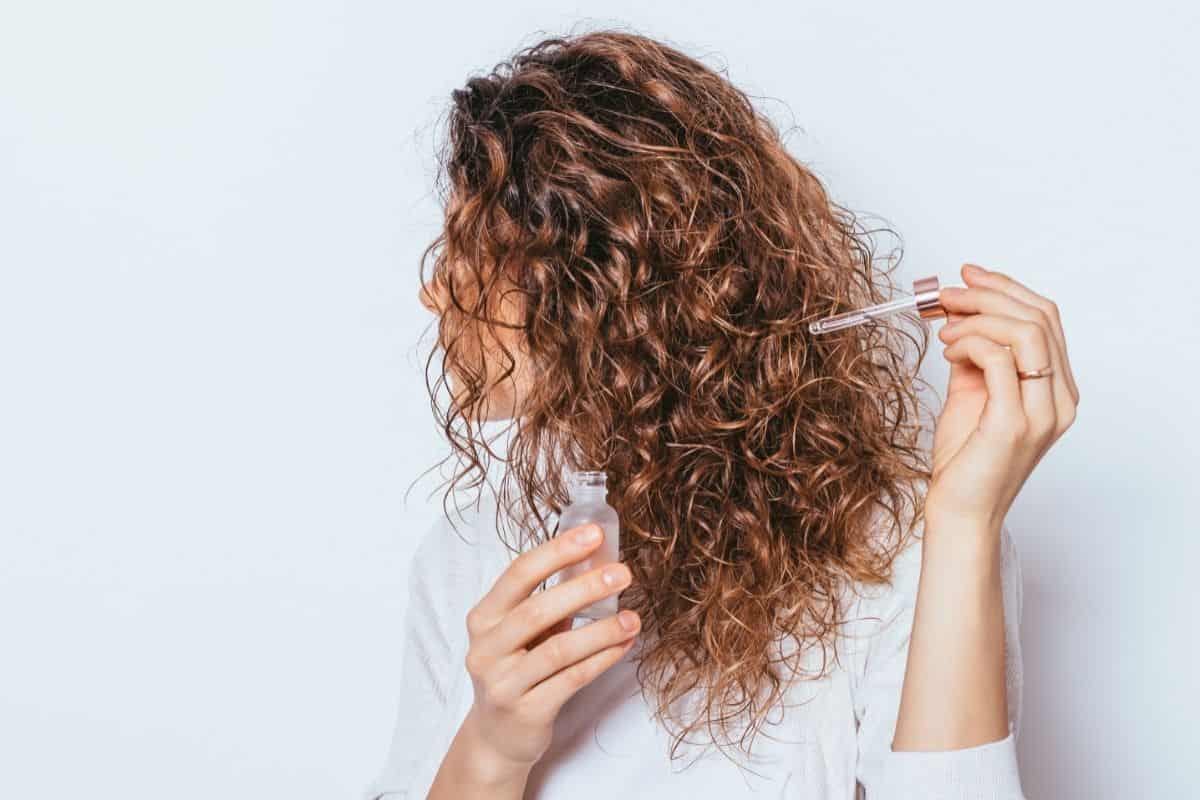
There are two main options available to you – either you can go down the route of having your hair professionally repaired, or you can take matters into your own hands.
Professional Repair
If you decide that professional repair is the right option for you, then you need to make sure that you choose someone who knows what they’re doing.
A reputable salon will have qualified technicians who specialize in repairing damaged hair.
They’ll be able to assess whether your hair requires repairs, and then carry out any necessary work.
Natural Home Remedies
If you prefer to tackle the issue yourself, then you can always opt for natural methods. Natural methods have long been used as a way of treating damaged hair.
Some people swear by apple cider vinegar, while others swear by lemon juice.
Whatever method you choose, using regular kitchen and household products is a great and economical way to go when it comes to fixing your hair.
When it comes to restoring damaged hair through natural methods, it’s important to keep two things at the forefront of your mind… 1) Protein and 2) Moisture!
Protein
Restoring the protein in your hair is essential if you want to see real results. If you’re looking to restore damaged hair naturally, then you’ll need to ensure that you use products that contain high levels of protein.
You might even consider taking protein supplements on top of your regular shampooing routine.
When hair is over-processed through the use of chemicals, it can cause the proteins within the hair shaft to break down.
The result is dry brittle hair. By adding more protein back into your hair, you can help prevent this from happening.
Adding protein back into your hair isn’t just beneficial for repairing damaged hair, but also helps with healthy hair growth. It’s important to remember that protein is the building block of all living cells.
So, if you want to grow strong, thick hair, then you need to add protein back into your diet and use natural methods of restoring your hair.
Natural pH-Balancing and Protein Remedies
Apple Cider Vinegar (ACV) and Honey
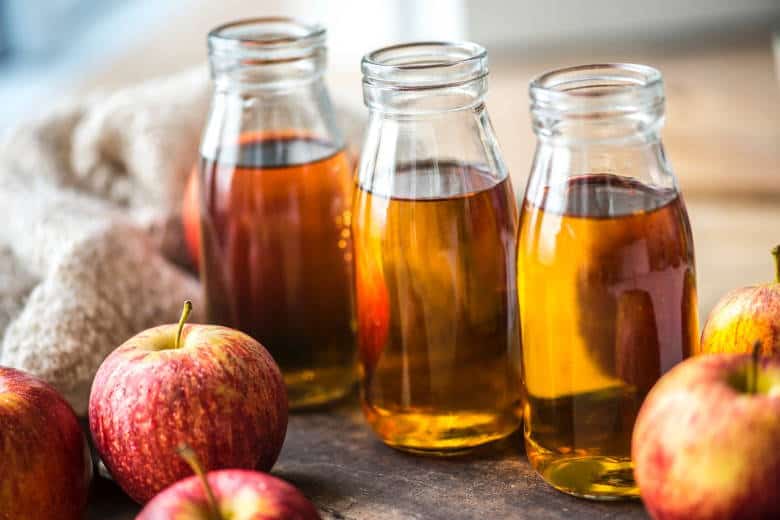
One of the best ways to get your hair’s pH-balance back is through apple cider vinegar.
Apple cider vinegar contains enzymes that help to reduce buildup, treat dandruff, and make hair shiny.
An irritated and dry scalp will often produce dandruff, or dead skin cells. When dead skin cells build up in your hair, they clog the follicles and stop nutrients from getting to the roots.
This causes your hair to become weak and prone to breakage.
The good thing about ACV is that it doesn’t leave your hair feeling greasy; however, it does have a strong smell. To combat this, you can try diluting ACV with water before applying it to your hair.
ACV can be combined with honey for a nourishing hair mask. Honey has antibacterial properties, so it’s perfect for helping to cleanse your scalp.
Eggs and Yogurt
Another way to get protein back into hair without leaving behind a nasty smell is to use eggs.
Egg yolks are rich in protein, so you can apply raw egg yolk directly onto your scalp or hair.
This will allow you to absorb the protein into your hair. Eggs can be combined with yogurt and even olive oil to make an effective hair mask.
Banana and Avocado
You can also combine banana and avocado to create a nourishing hair mask that will help to restore damaged hair.
Banana has a moisturizing effect on the hair, while avocados are packed full of vitamin E.
Vitamin E is known to protect against free radical damage. Free radicals are one of the main reasons why hair becomes dry and brittle.
Deep Condition
Deep conditioning works to hydrate and restore your hair to a more manageable, healthy state.
Deep conditioners are often made from coconut oil, olive oil, grapeseed oil, almond oil, avocado oil, jojoba oil, macadamia nut oil, sunflower seed oil, shea butter, and argan oil.
It’s recommended that you deep condition your hair once every week or so. Deep conditioning is especially useful for those with damaged hair caused by over-processing.
To deep condition your hair, simply combine the ingredients of your choice to create a mask and cover your hair and scalp.
Once covered, use a shower cap or plastic cap to cover the hair for 40 minutes to an hour. Some of the best deep conditioning ingredient combinations include:
- Coconut Oil & Shea Butter
- Almond Oil & Coconut Oil
- Avocado Oil & Almond Oil
- Jojoba Oil & Argan Oil
- Olive Oil & Jojoba Oil
- Grapeseed Oil & Macadamia Nut Oil
- Sunflower Seed Oil & Avocado Oil
- Honey & Olive Oil
You should avoid using oils that have been processed with chemicals and only use wholly natural and ideally, organic products.
Moisture Is Everything
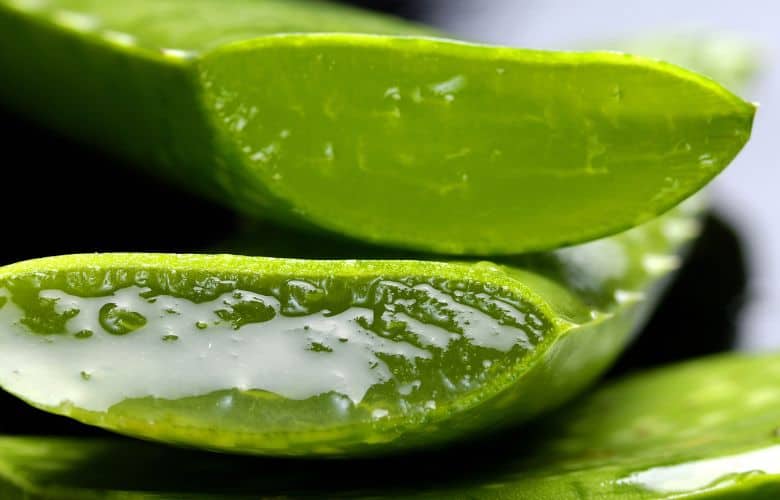
Over-processed hair can cause dryness, but there are definitely many things you can do it about it.
Moisturizers are great for restoring lost shine and softening frizzy hair. The most common types of natural moisturizer used in hair care are:
- Shea Butter
- Cocoa Butter
- Coconut Milk
- Aloe Vera Gel
- Castor Oil
- Tea Tree Oil
- Rosemary Oil
- Lavender Oil
Moisture is everything when it comes to restoring damaged hair. Restoring moisture to your hair will help to prevent breakage and encourage growth.
Natural Moisture Restoring Remedies
The following remedies are all-natural ways to restore moisture to your hair. They’re not as harsh as chemical treatments, and they won’t strip your hair of its natural oils.
The following shares some of our favorite nourishing natural moisture ingredient combinations for you to try at home;
Shea Butter and Honey
Shea butter works to soften and hydrate hair, while honey contains antioxidants that work to repair the damage. Combine these two ingredients to create a nourishing treatment that will leave your hair feeling silky smooth.
Coconut Milk and Rosemary Oil
This combination helps to restore shine and softness to your hair. Coconut milk is rich in vitamins A, B1, B2, C, D, and E, which are essential nutrients that promote healthy skin and hair.
Rosemary oil is high in vitamin K, which promotes new cell growth. Use this combination regularly to keep your hair looking shiny and full of life.
Coconut Oil (Raw) and Rosemary Oil
Coconut oil is known to be one of the best moisturizing oils out there. When combined with rosemary oil, it helps to restore strength and vitality to your hair.
This remedy has a lovely fresh scent, making it perfect for adding a little extra fragrance into your daily routine.
Argan Oil and Castor Oil
Argan oil is rich in fatty acids that act as powerful antioxidants and protect against free radicals. Castor oil is also naturally rich in vitamin E, which protects against premature aging.
These two ingredients work well together to revitalize your hair and give it a beautiful glow.
Cocoa Butter and Tea Tree Oil
Cocoa butter is packed with antioxidant properties and tea tree oil is high in antibacterial properties.
Together, they work to strengthen and improve the condition of your hair. This combination is ideal if you suffer from dandruff or split ends.
Aloe Vera
Aloe vera is an incredible plant that offers many benefits to your body and hair. It’s loaded with antioxidants, minerals, amino acids, enzymes, and vitamins.
Aloe vera gel is a wonderful addition to any hair regimen because it provides moisture without stripping away the natural oils that keep your strands strong and healthy.
Frequently Asked Questions
What Is A Pree-Poo?
A pre-poo is an effective way to prep your hair before applying any styling product. Prepping your hair first means that you’ll get better results from your styling products and less chance of them being absorbed by your scalp.
Pre-pooing involves applying a combination of natural oils such as the ones listed above and moisturizing the hair before washing it.
Final Considerations
Overall, I recommend using a mixture of natural oils to treat over-processed permed hair. I found that coconut oil mixed with shea butter and honey is particularly good at restoring moisture to dry hair.
It’s also important to remember that the more often you use these natural remedies, the longer-lasting their effects will be.
If you want to start treating your hair with natural oils, I recommend starting with just one or two of the mixtures we went over.
You can always experiment with different combinations until you find something that suits you and your type of hair.